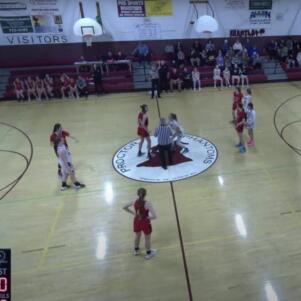Remembering selfless baseball great Roberto Clemente
By Mary McCleary | April 1, 2016, 13:02 EDT
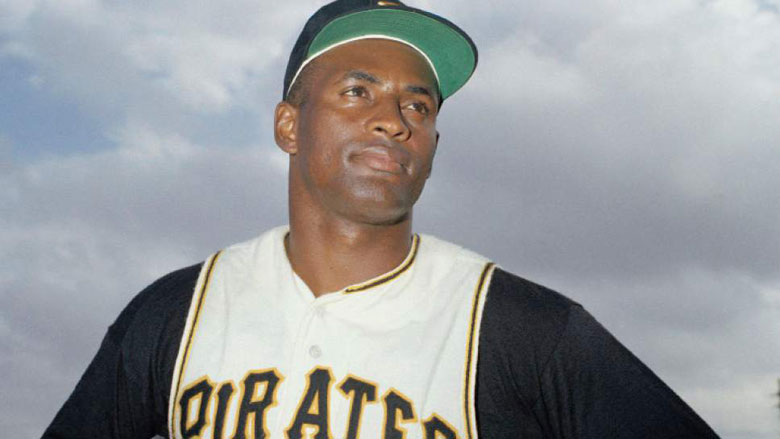 (AP photo)
(AP photo) Baseball’s season opener is a time of hope and nostalgia. We look forward to warmer weather and the prospect of a winning team, and we remember the trailblazing players who made the game what it is today. One of the finest men to grace the field, Roberto Clemente, was the first Latin American to help win a World Series as a starter. He was also the first to be awarded both the National League and World Series MVP. Clemente’s inspiring story spread worldwide after his untimely death transporting emergency supplies to Nicaraguan earthquake victims.
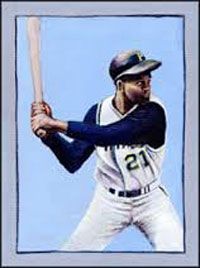
(Courtesy of Wikipedia)
Born in 1934 in Carolina, Puerto Rico, Clemente was one of seven children. As a youngster, he worked in the sugar crop fields where his father was a foreman. From an early age, Clemente’s baseball skills were evident playing for his hometown team in Barrio San Antón. During his first year in high school, he was recruited as a shortstop for Sello Rojo. When he was 16 years old, Clemente joined the amateur league team, Ferdinand Juncos, and was selected two years later to play for the professional level Santurce Crabbers.
In February 1954, the Brooklyn Dodgers recruited Clemente to play for one of their Triple A affiliates, the Montreal Royals. Life wasn’t easy for the young Clemente. He had trouble adjusting to the frigid climate and foreign languages of Canada. He was also treated unfairly by the Dodgers, who tried to avoid putting him on the big league roster.
The Royals manager, Max Macon, also tried to prevent the Pittsburgh Pirates’ pitching coach, Clyde Sukeforth, from seeing Clemente play during a scouting trip to Montreal. But Sukeforth witnessed enough of Clemente’s acumen to select him in the rookie draft of November 1954.
Sukeforth later recalled, “Well, I said to myself, there’s a boy who can do two things as well as any man who ever lived. Nobody could throw any better than that, and nobody could run any better than that.”
“There’s a boy who can do two things as well as any man who ever lived. Nobody could throw any better than that, and nobody could run any better than that.” — Brooklyn Dodgers scout, Clyde Sukeforth
The rookie season was rocky for Clemente. As a right fielder for Pittsburgh, he had to adjust to yet another country, and his busy practice schedule prevented him from learning English well. He was also forced to sit out a number of games because of a back injury caused by a drunk driver, who had hit his car the previous year.
In addition to these travails, Clemente was troubled by the patronizing attitude of many people in baseball. For example, despite his insistence on being called Roberto, his teammates, sportswriters, and announcers persistently called him Bob or Bobby. Not only did Clemente face discrimination as a Hispanic, but he also faced prejudice as a Black player, since he was of African descent. Reflecting the societal bias at the time, the Pirates had only decided to break the baseball color line the year before Clemente started.
Despite these setbacks, Clemente embraced his new country. He decided to join the U.S. Marine Corps Reserve during the 1958-59 winter season. The player spent six months on active duty in the Carolinas and in Washington, D.C, and remained in the Marine Corps Reserve until 1964.
In addition to his spinal woes, Clemente suffered a host of other injuries throughout his years in baseball. Nevertheless, he persevered and helped the Pirates advance to the World Series in 1960 by maintaining a batting average above .300, with a team-high 94 RBI. He also hit .310 in the 1960 Fall Classic, helping Pittsburgh defeat the Yankees in the seven-game World Series.
Clemente had several milestone achievements after the 1960 championship. In 1966, he won the National League’s Most Valuable Player Award, and had 12 straight Gold Glove Award seasons. He also led the Pirates back to the World Series in 1971. With a .414 batting average, Clemente helped the team defeat the Orioles, and earned the Series’ MVP Award as well. He is considered by many as the greatest right fielder in history.
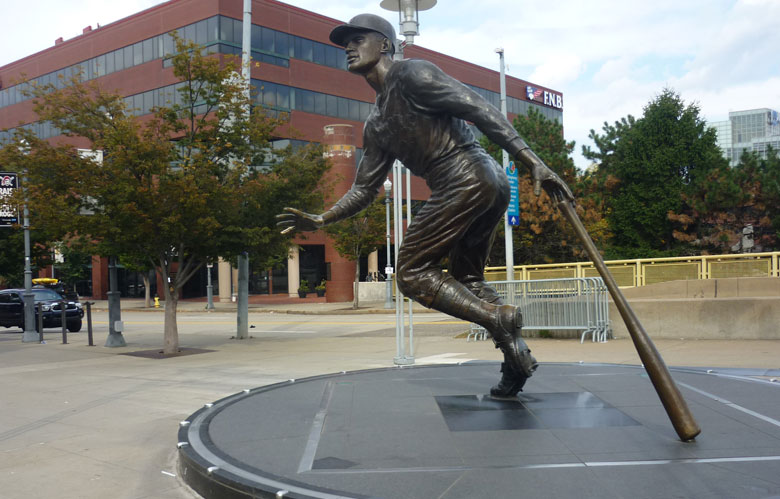
(Courtesy of Wikipedia)
Off the field, Clemente was a devoted family man. In 1964, he married Vera Zabala in Carolina, Puerto Rico, and the couple subsequently had three sons. He was also a devout Catholic. Despite his success, Clemente never forgot the people he left behind. He continued to play in the Puerto Rican winter league until 1958. Later, he managed the Senadores team during off-seasons.
“Whether on the diamond or on the front lines of charitable endeavor … his selfless dedication to helping those with two strikes against them in life has blessed thousands and set an example for millions.” — Presidential Citizens Medal citation
Clemente’s popularity grew with time, both in the U.S. and abroad. On July 28, 1970, the Pirates stadium celebrated a “Roberto Clemente Night,” and Puerto Rican fans gave him a scroll with 300,000 congratulatory signatures. Clemente asked that the thousands of dollars he received in donations be given to charity.
This generous deed was not an isolated incident. Throughout his career, Clemente undertook many charitable activities, both at home and in other Caribbean and Latin America countries. In fact, he was performing one of these good works when he tragically met his death.
On Dec. 23, 1972, a 6.2-magnitude earthquake struck the Nicaraguan capital of Managua. Hours later, two strong aftershocks shook the city, leaving a total of 6,000 dead, 20,000 injured, and upwards of 250,000 homeless. Clemente organized large relief efforts for the beleaguered country, sending three airplanes full of emergency aid.
However, news reached Clemente that all the supplies he sent were purloined by corrupt Nicaraguan government officials. So on New Year’s Eve, he traveled with a fourth plane to ensure that the emergency provisions were properly distributed to the victims.
Shortly after takeoff, the overloaded four-engine plane was besieged with problems. The aircraft had a history of mechanical troubles, and crashed into the Atlantic Ocean near Isla Verde, Puerto Rico. Some days later, the pilot’s body and fuselage remnants were recovered. However, the remains of the four other passengers on board, including Clemente, were never located.
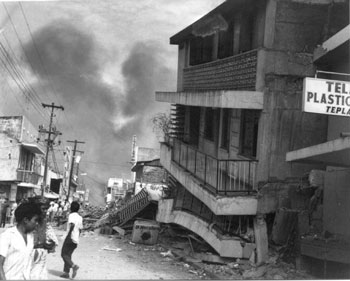
Nicaragua earthquake (Courtesy of Flickr)
The devastating loss prompted an outpouring of accolades for the courageous baseball player. The Hall of Fame waived its usual five-year waiting period, and inducted Clemente in 1973. He was also posthumously awarded three of the highest civilian honors; the Congressional Gold Medal (1973), the Presidential Citizens Medal (1973), and the Presidential Medal of Freedom (2003).
In 1973, the Pirates retired Clemente’s number 21, which represented the total letters in his full name, Roberto Clemente Walker. That same year, Major League baseball renamed the annual Commissioner’s Award the Roberto Clemente Award. This honor is presented at the World Series to the player who “best exemplifies the game of baseball, sportsmanship, community involvement and the individual’s contribution to his team.” The award also comes with a sizable donation to a charity selected by the recipient.
Recently, filmmaker Richard Rossi spearheaded the cause for Clemente’s canonization. Rossi made the feature classic, “Baseball’s Last Hero: 21 Clement Stories.” He received several letters of support for the canonization initiative, including one from Pope Francis, and another from Los Angeles Archbishop José Gomez.
Clemente remains a hero to many baseball fans, as well as for others who have been inspired by his humanitarian endeavors. The citation of the Presidential Citizens Medal summarized his legacy, both in the sport and beyond:
“All who saw Roberto Clemente in action, whether on the diamond or on the front lines of charitable endeavor, are richer for the experience. He stands with the handful of men whose brilliance has transformed the game of baseball into a showcase of skill and spirit, giving universal delight and inspiration. More than that, his selfless dedication to helping those with two strikes against them in life has blessed thousands and set an example for millions.”
Contact Mary McCleary at [email protected].





